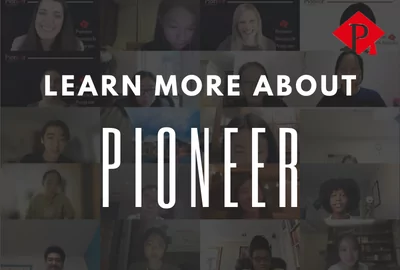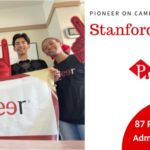Taking part in a virtual research program from a recognized research institute can be beneficial to high school students for many reasons. Not only are students able to dive deeper into their passions and interests, but it can also be a good way to impress colleges with proven sophisticated skills that may get you standing out in college applications.
However, finding the best virtual research opportunities can be challenging for some students. Fortunately for you, the four common types of research listed below will help you pick a good research topic and start your project.
Additionally, this article will show you other types of research for high school students and teach you how to pick the best research field for you.
If you are ready to cultivate your research interests, please read on.
4 Common Types of Online Research
One of the things most high school students do not know when looking up virtual research opportunities is that there are different types of research, each providing different results. For this reason, the type of research you will pursue should depend on the answers you seek.
Let us see how below.
Basic research
This refers to research done to improve one’s knowledge or understanding of a particular subject. It is also often referred to as fundamental or pure research.
Unlike other types of research, basic research does not seek to solve a certain problem. Instead, high school students using this research approach are looking to understand a given subject better.
An example of basic research in education would be something like “How do various teaching methods affect students’ concentration in class?” Information gathered in this research would provide a better understanding of the topic.
Virtual research opportunities transcend basic research methods.
What can you still get out of basic research?
- Enhances acquisition of new knowledge
- Increases your understanding and interpretation of a certain subject matter
- Expands your pool of knowledge
- Forms the basis (foundation) of applied research
An example of basic research from The Pioneer Research Journal of 2021 is:
- Research topic – Being’s Chain, God’s Death, and Atlas’s Shrug: How Meaning is Blurred and Deferred in the Consideration of Godlessness and Freedom (philosophy) by Anna Kassim from London.
- Findings – There is a conceptual division to which language and the history of ideas have given rise.
- Conclusion – The blurring of the literal and figurative allows us to manipulate, unknowingly and purposefully, the boundaries of meaning on the account of context, intention, and interpretation.
Quantitative research
This involves collecting and analyzing numerical data. The data is collected from existing sources or gathered using quantitative methods like questionnaires, surveys, and polls. The data analysis process uses computational, mathematical, and statistical techniques to provide sought-after answers.
An example of a quantitative research question would be, ” How much time does a doctor take to tend to patients when the patients walk into the hospital?” Additionally, one method a high school student would use to conduct research would be a survey, e.g., a patient satisfaction survey.
Curious to see a quantitative research example from a Pioneer student? Here’s one.
- Research topic – Mutability and Functions of SARS-CoV-2 ORF9b (biology) by Xiaoyi (Charlotte) Shi from Shanghai.
- Findings – Only Betacoronavirus lineage B employs the N internal open reading frame ORF9b protein to evade the immune system.
- Conclusion – The effect of ORF9b-TOM70 interaction on inhibiting the immune pathway, modulating apoptosis, and inducing mitophagy should be further investigated to better understand SARS-CoV-2’s pathogenicity and provide clues for therapy design.
Qualitative research
Think of qualitative research as the opposite of quantitative research. Instead of looking at numerical data with the question “how often,” qualitative research seeks to discover why and how certain things occur.
This research method collects and analyzes non-numerical data, such as audio, video, or text. For example, high school students conducting qualitative research projects would use information gathered from focus groups, interviews, and observations.
The results from this research type would help understand a concept, opinion, or experience better or obtain new information about an existing problem.
It is important to note than many research projects will involve more than one type of methodology and that the choice of which methodology to use will be driven by the nature of the research question.
Below is an example of a qualitative research project by a Pioneer student.
- Research topic – The Consequences of Urbanization on Access to Housing and Education in Turkey: Struggles and Coping Strategies of Syrian Refugees (sociology/international relations) by Ezgi Erzincan from Istanbul.
- Findings – Syrian refugees stayed in places with insufficient infrastructure and accommodated multiple families in one house to afford the high rental prices. The large classes created problems for children’s access to education because of overcrowded classrooms and the high cost of transportation.
- Conclusion – Urbanization has many negative consequences for housing possibilities and accessing education for Syrian refugees who live in Turkey.
Market research and competitive research
Market and competitive research allow you to gather information about a particular industry, say the food industry, and the companies in that industry.
For example, if you research the market, you can identify customers and their needs. Additionally, the competitive analysis will help you gain insight into your competitors and their business position.
Market research and competitive analysis are often done by companies in the industry or those looking to join. However, this type of research is also great for high school students looking for virtual research opportunities.
Below is an example of market and competitive research from a Pioneer student.
- Research topic – Myanmar Risk Analysis: McDonald’s Case Study (international relations) by Catherine He from St. Catharines, Ontario, Canada.
- Findings – McDonald’s could potentially damage its reputation by prematurely developing a Myanmar location during the COVID-19 pandemic and a military coup where thousands are dying.
- Conclusion – McDonald’s should delay and potentially reconsider its expansion into Myanmar for now.
Other Common Types of Research
Comparative research
This type of research compares two or more groups to discover something specific about one of the groups or draw a conclusion about the things being compared.
A research team (or student) using this approach will identify the similarities and differences between the groups in comparison, then come to a conclusion. Additionally, keep in mind that you can use quantitative and qualitative research methods in this approach.
Medical research
Medical or biomedical research involves research in various fields, such as chemistry, biology, pharmacology, and toxicology. This type of research aims to improve already available medical procedures and develop new procedures and medicines.
Medical research may be a good fit for high school students taking up life sciences or looking to join a related undergraduate program.
Legal research
Ideally, legal research looks to answer a legal question by verifying the law and reading statuses or cases. This is a good type of research, especially independent research, for students pursuing social sciences like history or sociology in high school or later in undergraduate and graduate studies.
Product research
This type of research focuses on whether or not a certain product idea will be successful. The research looks at the current customer needs and if the idea can meet the market demand. In addition, the end goal of this research is to determine if a better ROI (return on investment) can be achieved by the product.
Empirical research
Empirical research is any research where the conclusion is only drawn from empirical or verifiable evidence. Unlike other types of research, empirical research relies solely on practical experience and not theory.
Biomedical and laboratory research are some projects you can pursue in this research type.
Descriptive research
This research method involves observing and measuring variable data like population or a given phenomenon. Instead of answering why questions, descriptive research opportunities answer when, where, what, and how questions.
Experimental research
Experimental research is the opposite of descriptive research. It uses a scientific approach to compare two variables, one a constant and the other one that researchers can manipulate. Besides being compared, the variables are measured and calculated to support or reject a certain hypothesis.
Exploratory research
Exploratory research is also known as the grounded theory approach or interpretive research. It aims to explore research questions that haven’t been looked at in depth. Although often qualitative, this research approach can also be quantitative depending on the sample quantity in question.
How Do I Pick the Right Kind of Research Question?
Let’s face it, picking the right kind of research is no walk in the park, especially for those without prior research experience. Many factors will affect your decision, such as your interests, research skills, whether you are enrolled in research programs, and what you want to pursue in undergraduate programs and graduate studies.
While pursuing research projects in high school helps you learn more about a subject of interest, it is also great for college applications. For this reason, students are strongly encouraged to pick research related to their current and future interests.
Choose the topic and your end goal
Ideally for high school students, it is always best to begin by immersing in an area first and then choosing a research topic before determining the research type. school students should pursue the research topic based on subjects or disciplines they are interested in or passionate about.
Why is this important? Research involves a lot of reading and writing and re-reading and re-writing. So, imagine how challenging it would be if students work on a topic they are not curious about.
Once you have chosen a topic, you need to determine the end goal. What do you aim to achieve with your research project? This also helps you narrow your research topic to something more manageable, especially for high school students with minimal research experience.
Now, you can look at previous projects in the same field to determine the methods used and if research resources are available. This will help you determine the research type for your project.
Virtual Research Opportunities With Pioneer Academics
Mentors play a key role in research experiences. They advise and guide you throughout your project to ensure you reach the desired goals.
That is why Pioneer Academics, the ONLY fully-accredited virtual research program, ensures that professor mentors embrace Pioneer’s high standards throughout their projects. Additionally, Pioneer offers students a vast pool of resources to use for research. Pioneer has high standards of selectivity and a rigorous academic system as well. However, it is the only online research program in the U.S that is qualified to grant college credit.
If you are on the hunt for virtual research opportunities, sign up for an online information session today to learn more about Pioneer’s research program details.




 Doing research is commonplace.
Doing research is commonplace.


